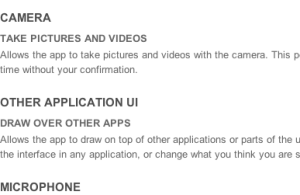Google Thinking About How To Let Users Cherry-Pick App Permissions
 When you download an app from the Google Play store — or when an update to an already downloaded app includes a change in permissions — users are required to accept those permissions before downloading. But there is no way to say no to any single permission, so users are either begrudgingly downloading apps with permissions they don’t want or not downloading otherwise acceptable apps because they are concerned about these permissions. But one Google engineer says there may be some hope.
When you download an app from the Google Play store — or when an update to an already downloaded app includes a change in permissions — users are required to accept those permissions before downloading. But there is no way to say no to any single permission, so users are either begrudgingly downloading apps with permissions they don’t want or not downloading otherwise acceptable apps because they are concerned about these permissions. But one Google engineer says there may be some hope.
According to MobileBurn.com, Android Framework Engineer Dianne Hackborn was recently asked about the possibility of apps with optional permissions.
“There have certainly been a lot of thoughts put into this,” she responded. “There’s nothing that we can commit to doing right now, but we’re definitely thinking about this.”
It could just be a pipe dream, as it may be a technological nightmare to require that all apps come with permissions that can be turned on and off by the user. What may seem like a pernicious permission to the user may be, in actuality, quite innocuous but necessary for the regular functioning of the app.
There are of course already apps that allow people to disable functionality once the app is launched. For example, while many Android apps require you to allow for the app to determine your location, some give the user the ability to turn that functionality off and on at will.
We definitely think that Google could go a long way toward clearing up many consumers’ concerns about app permissions simply by being more accurate in the description of the permissions in Google Play store.
For instance, we receive countless e-mails from people convinced that one app or another is secretly taking photos of them because of the way Google describes camera permissions:
TAKE PICTURES AND VIDEOS
Allows the app to take pictures and videos with the camera. This permission allows the app to use the camera at any time without your confirmation.
We can see how someone could think that last part would actually give the app the ability to just take pictures whenever it wants. But that’s not what the permission intends to state. Instead, it means that when you use that app to take a photo, you do not need to confirm that it is okay for the app to snap the picture every time. Regardless, it’s so vaguely worded that a growing number of people would rather not download an app with that permission than worry about the cameras taking photos of the inside of their pockets.
It’s just one example of awkwardly worded permissions on the Google store, and one that gives rise to many concerns from users.
And unlike optional permissions, it would be a lot easier for Google to clarify the wording of its permissions than it would be for the company to begin offering the ability to disable certain permissions.
Want more consumer news? Visit our parent organization, Consumer Reports, for the latest on scams, recalls, and other consumer issues.

